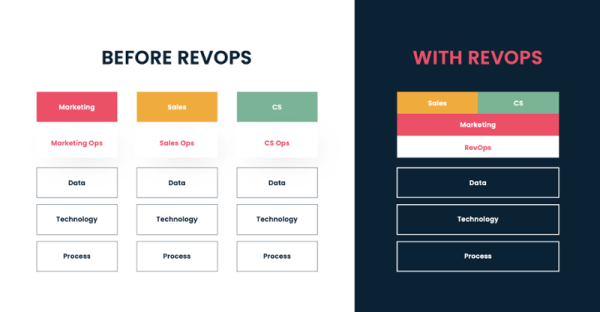






In today's business landscape, the terms "RevOps" and "Sales Ops" have become increasingly popular. While they share some similarities, they also have key differences that set them apart. In this article, we'll explore these differences, starting with the basics and delving deeper into the benefits of each approach.
Understanding the Basics of RevOps and Sales Ops
Revenue growth is essential for any organisation's success, and achieving this goal requires a strategic approach to managing revenue streams. This is where Revenue Operations (RevOps) comes in. RevOps is a relatively new concept that has gained popularity in recent years. It involves aligning sales, marketing, and customer success teams to work together towards the common goal of driving revenue growth.
RevOps is not just a department; it's a mindset that permeates the entire organisation. It aims to streamline processes, improve operational efficiency, and enhance the customer experience. By aligning all revenue-generating teams, RevOps ensures that everyone is working towards the same goal, which is to drive revenue growth.
What is RevOps?
RevOps is a strategic approach to managing an organisation's revenue streams. It involves breaking down the silos between sales, marketing, and customer success teams and aligning them to work together towards the common goal of driving revenue growth. RevOps aims to streamline processes, improve operational efficiency, and enhance the customer experience.
RevOps is not just about implementing new technology or tools; it's about creating a culture of collaboration and alignment. It involves setting clear goals and metrics that everyone can work towards. By aligning all revenue-generating teams, RevOps ensures that everyone is working towards the same goal, which is to drive revenue growth.
What is Sales Ops?
Sales Operations (Sales Ops) is a more specialised approach to managing sales operations. It focuses on optimising the sales process, forecasting and reporting on sales performance, and improving sales team efficiency. The goal of Sales Ops is to ensure that sales teams have the tools they need to close deals successfully and efficiently.
Sales Ops involves analysing data to identify areas of improvement in the sales process. It also involves implementing new tools and technology to make the sales process more efficient. Sales Ops teams work closely with sales teams to ensure that they have the support they need to be successful.
Sales Ops is essential for any organisation that wants to drive revenue growth. By optimising the sales process and improving sales team efficiency, Sales Ops can help organisations close deals more quickly and effectively.
Key Differences Between RevOps and Sales Ops
Revenue operations (RevOps) and sales operations (Sales Ops) are two essential functions in any organisation that aims to optimise its revenue generation. Both of these functions play a crucial role in ensuring that an organisation's revenue-generating processes are efficient and effective. However, there are significant differences between these two functions.

Scope and Focus
While both RevOps and Sales Ops are concerned with improving revenue generation, they have different scopes and focuses. RevOps is more comprehensive in its approach since it deals with all functions related to revenue generation. It includes marketing, sales, and customer success. RevOps teams work together to ensure that all departments are aligned and working towards common revenue goals. They focus on improving the entire revenue-generating process from lead generation to customer retention.
On the other hand, Sales Ops is chiefly focused on optimising the sales process. Sales Ops teams work closely with sales teams to improve sales efficiency and forecasting. They focus on improving the sales process from lead qualification to deal closure.
Team Structure and Roles
Another significant difference between RevOps and Sales Ops is their team structure and roles. RevOps is typically structured around a central team that oversees all revenue-generating functions. This team comprises professionals from different departments who work together to achieve common revenue goals. The team includes professionals from marketing, sales, and customer success departments.
On the other hand, Sales Ops teams are more siloed and typically work in close conjunction with sales teams. They are responsible for improving sales efficiency and forecasting. Sales Ops teams are usually smaller and comprise professionals with specialised skills in sales analytics, sales processes, and sales technology.
Metrics and KPIs
Another significant difference between RevOps and Sales Ops is the metrics and KPIs used to measure success. RevOps often utilises broader metrics that encompass all revenue-generating functions, such as revenue growth, customer acquisition cost, and customer lifetime value. They focus on the overall health of the revenue-generating process.
Meanwhile, Sales Ops is more granular in its approach, focusing on sales-specific metrics like win rate, pipeline coverage, and sales cycle time. Sales Ops teams use these metrics to measure the effectiveness of the sales process and identify areas for improvement.
In conclusion, while both RevOps and Sales Ops are essential functions in any organisation, they have different scopes, focuses, team structures, and metrics. Organisations need to understand these differences to ensure that they have the right people, processes, and technology in place to optimise their revenue generation.
The Benefits of Implementing RevOps
RevOps, short for Revenue Operations, is a relatively new approach to revenue generation that has been gaining popularity in recent years. It involves bringing together the sales, marketing, and customer success departments to create a cohesive and efficient revenue-generating machine. Here are some of the benefits of implementing RevOps in your organization:
Improved Alignment Across Departments
One of the primary benefits of RevOps is that it encourages teamwork and communication among different departments. This approach facilitates better alignment and cooperation in achieving revenue targets, reduces conflicts, and eliminates silos between departments. When different teams are working together towards a common goal, it can lead to better outcomes and a more positive work environment. According to research by SiriusDecisions, companies that adopt a RevOps strategy see an average of 19% revenue growth within a year.
For example, imagine a scenario where the marketing team is generating leads, but the sales team is not following up on them effectively. This can lead to lost opportunities and frustration between the departments. With a RevOps approach, there would be clear communication and processes in place to ensure that leads are followed up on promptly and effectively.
Streamlined Processes and Increased Efficiency
RevOps aims to eliminate inefficient processes and streamline operations that can impact revenue generation. By centralising revenue-generating functions, RevOps can identify and address process bottlenecks proactively. Using data and analytics, it can also optimise sales, marketing, and customer success operations, resulting in increased efficiency and reduced costs.
For example, imagine a scenario where the sales team is manually entering data into a CRM system, which is time-consuming and prone to errors. With a RevOps approach, there would be automated processes in place to ensure that data is entered accurately and efficiently. This would free up time for the sales team to focus on selling and generating revenue.
A recent McKinsey study revealed that companies that adopt a revenue operations approach can expect a 10-25% increase in productivity across multiple departments. This increased efficiency can lead to significant cost savings and improved profitability.
Enhanced Customer Experience
By bringing together sales, marketing, and customer success functions, RevOps ensures a cohesive, engaging, and consistent customer experience. This approach generates customer satisfaction through efficient and effective communication, services, and solutions. Research shows that customer experience is a major factor in brand loyalty, and companies focusing on delivering excellent customer experiences can realize a 10-15% increase in revenues.
For example, imagine a scenario where a customer has a problem with a product they purchased. With a RevOps approach, there would be clear communication and processes in place to ensure that the customer's issue is resolved quickly and effectively. This would lead to a more positive customer experience and increased loyalty to the brand.
In conclusion, implementing a RevOps approach can lead to improved alignment across departments, streamlined processes and increased efficiency, and enhanced customer experience. These benefits can lead to significant revenue growth and improved profitability for your organisation.
The Benefits of Implementing Sales Ops
Implementing Sales Ops in your organizstion can have a significant impact on your sales process, sales forecasting, and overall sales team performance. Here are some additional benefits:
Sales Process Optimisation
With Sales Ops, you can gain a complete view of the entire sales process. This means you can identify bottlenecks and areas of inefficiency and take action to optimise the process. By using data insights, Sales Ops teams can identify opportunities to improve conversion rates, shorten sales cycles, and improve customer engagement. Research studies show that companies with sales processes that are responsive to customer needs can see a 55% improvement in customer acquisition rates.
In addition, Sales Ops can help you streamline your sales process by automating repetitive tasks and reducing manual data entry. This can free up your sales team to focus on more high-value activities, such as building relationships with customers and closing deals.
Better Sales Forecasting and Reporting
Sales Ops can provide sales teams with more accurate sales forecasting, which facilitates strategic planning and effective resource allocation. By using data analysis and sales performance metrics, Sales Ops teams can identify trends and patterns to improve sales forecasting accuracy. Companies with proactive sales forecasting can expect up to 30% higher accuracy in sales forecasting compared to those who rely on outdated methods.
In addition, Sales Ops can help you generate more comprehensive and insightful sales reports. This can help you identify areas of strength and weakness in your sales process, and take action to improve performance. With better reporting, you can also communicate more effectively with stakeholders, such as executives and investors.
Enhanced Sales Team Performance
To be effective, sales teams need relevant and actionable insights into sales performance. Sales Ops teams help provide this by identifying areas where sales reps need training and coaching support. By analysing data and metrics, Sales Ops teams can implement personalised training, coaching, and communication strategies, which lead to improved team performance. In addition, study shows that companies using sales gamification and reward strategies can expect a 20% increase in sales performance.
With Sales Ops, you can also improve collaboration and communication within your sales team. By using tools such as CRM systems and sales enablement platforms, you can ensure that everyone is working towards the same goals and has access to the same information. This can help you build a more cohesive and effective sales team.
Conclusion
RevOps and Sales Ops each have a unique focus and approach toward revenue generation, but they complement each other very well in a modern, agile organization. By focusing on the buyer's journey and scrutinizing all data offered in the form of data points and KPI metrics, an ideal implementation of RevOps and Sales Ops will optimize all stages of the customer acquisition, retention, and loyalty journey. Companies that adopt these approaches to revenue generation benefit from improved alignment among departments, streamlined operations, data-driven decision-making, and enhanced customer experience.








